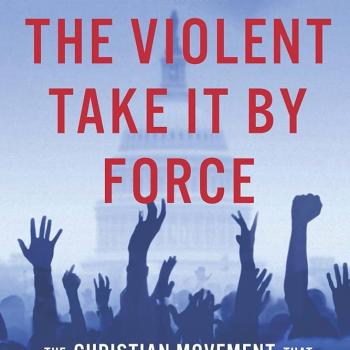According to research by the Barna Group:
The most common perception is that present-day Christianity is “anti-homosexual.” Overall, 91 percent of young non-Christians and 80 percent of young churchgoers say this phrase describes Christianity. As the research probed this perception, non-Christians and Christians explained that beyond their recognition that Christians oppose homosexuality, they believe that Christians show excessive contempt and unloving attitudes towards gays and lesbians. One of the most frequent criticisms of young Christians was that they believe the church has made homosexuality a “bigger sin” than anything else.
How did such a strange thing come to pass?
Theory No. 3: The Innocent Backlash
This theory requires our serious attention because it is so widely held — or, at least, widely claimed.
Before taking a closer look at this explanation, we need to underscore the particular claims made by the respondents to the Barna survey quoted above. American Christianity has come to be perceived, first and foremost, as “anti-homosexual.” This is not simply due to a moral/ethical teaching that precludes any sexual activity outside of monogamous, heterosexual matrimony — Barna’s respondents explicitly stated that the anti-homosexuality that characterizes American Christianity goes “beyond” that, into the realm of “excessive contempt.” The meaning of the word “excessive” here is clear: the contempt for homosexuals that characterizes American Christianity exceeds mere ethical/theological objection; it is inappropriately severe; it is disproportionate, inordinate, intemperate.
Proponents of the innocent backlash theory thus have to begin by arguing that this perception is inaccurate — that nine out of 10 young non-Christians and four out of five young churchgoers have somehow gotten the wrong idea. The contempt American Christianity displays toward homosexuals, these proponents say, is just the right amount.
Christians, this theory holds, do not regard homosexuals as particularly or especially deserving of condemnation, it’s just that homosexual activists have become so vocal in promoting their radical homosexual agenda that — purely in response — Christians have been forced to become equally vocal in reply. Every action has an equal and opposite reaction — that’s elementary physics. Christians have simply been reacting to the radical homosexual agenda, and this reaction has been equal and opposite (and therefore not at all “excessive”).
The explanation for the (mis)perception that American Christianity is inappropriately anti-homosexual is thus something that any grade-school child can understand: They started it.
“They” (the homosexuals) started this disagreement and we American Christians are merely reacting, responding, replying — that is the essence of this theory. This explanation is almost universally cited among anti-homosexual leaders of the religious right, but it is also widely cited by go-slow “liberals” who urge homosexuals seeking equal rights to marry or to serve openly in the military not to push too hard for these goals. Push too hard, they advise, insist too strenuously that you be treated equally, and you invite just the sort of backlash that Barna records here.
This sounds a great deal like a warning to homosexuals to “remember your place” — a warning that echoes similar counsels of caution against an earlier struggle for equal rights. The best response to such warnings is that of Martin Luther King Jr. in his “Letter from a Birmingham Jail“:
Frankly, I have never yet engaged in a direct action movement that was “well timed,” according to the timetable of those who have not suffered unduly from the disease of segregation. For years now I have heard the [word] “Wait!” It rings in the ear of every Negro with a piercing familiarity. This “Wait” has almost always meant “Never.” We must come to see with the distinguished jurist of yesterday that “justice too long delayed is justice denied.”
But the more pertinent argument in King’s letter is his correction of the confusion of cause and effect at the heart of every innocent backlash theory:
You deplore the demonstrations that are presently taking place in Birmingham. But I am sorry that your statement did not express a similar concern for the conditions that brought the demonstrations into being. I am sure that each of you would want to go beyond the superficial social analyst who looks merely at effects, and does not grapple with underlying causes.
“They started it,” is a claim of fact. The legitimacy and validity of the innocent backlash theory rests on whether that claim is true or false. And that claim is false. “Radical homosexual activists” pushing their “radical agenda” are no more the cause of the current disagreement than the Southern Christian Leadership Conference was the cause of the conflict in Birmingham.
The innocent backlash theory says that “excessive contempt” for homosexuals is a consequence — a predictable, reasonable, defensible consequence — of homosexuals refusing to remember their place. Or, in other words, refusing to accept their place as less than equal. The backlash is thus, inescapably, a defense of inequality. Even if the RHAs lived up to the rudest and most aggressively impolitic caricature drawn by their critics this would still be the case.
Proponents of innocent backlash theory recognize this, and they realize that a defense of inequality is indefensible. Thus they have gone to great lengths to try to reframe the matter not as one of equal rights, but as one of “special rights.” It’s hard to know what, if anything, this is supposed to mean. This is semantic sleight of hand, just like the larger attempt here to downgrade “reactionary” to merely “reactive.” Apparently second-class citizens who demand to be treated equally are asking for something “special.” The effort to relabel equal rights as “special rights” strikes me as an unironic affirmation of Anatole France’s ironic description of “The majestic equality of the law, which forbids rich and poor alike to sleep under bridges or to beg in the streets.”
Finally, the innocent backlash theory is incapable of answering our question because it refuses to do so. That question, again, is how did it come to be the case that an “excessive contempt” for homosexuals is the “most common perception” of American Christianity? The innocent backlash theory rejects this question, insisting that this contempt is not excessive, and that this common perception is simply mistaken. The fact that this perception is shared by “80 percent of young churchgoers” — people whose understanding of American Christianity comes from direct experience and from what they have been explicitly taught to believe in American churches — apparently only means that four out of five young churchgoers are too stupid to understand what they have been shown and taught. I find that implausible. The question is legitimate. The refusal to answer it is not.
Rereading the above, I’m not sure I’ve been as charitable as I’d like to have been in evaluating this theory. I have a hard time being charitable toward those who would argue that any degree of contempt can be less than “excessive,” or that blaming the victim is acceptable so long as you do it in God’s name. So later on I may need to revisit this theory — I’ll put some VapoRub under my nose to mask the stench and take a closer second look. But for now let’s move on.
Next up: The Exegetical Panic Defense.















